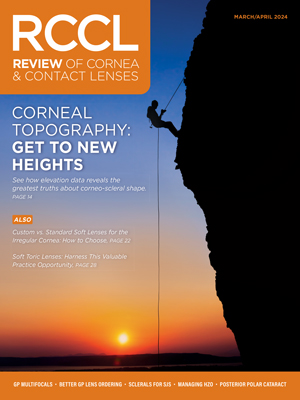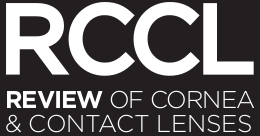Dietary Supplements
I was excited to read the article on “Dietary Supplements—The Good, the Bad and the Questionable” (Naked Eye, November 2010, Review of Cornea and Contact Lenses) because of my interest in nutrition. However, after reading the article a few times, I was hard pressed to find anything “good” that the authors had to say about nutrition’s role in eye disease.
The mostly negative approach the authors took seemed unfairly slanted. Here are a few examples:
• “The sale of dietary supplements is a business. In 2009, Americans spent approximately $26.7 billion on them.” Are they implying that the sale of pharmaceutical agents is not a business? In 2009, Americans spent over $325 billion on those—over ten times that of nutritional supplements!
• “Some supplement manufacturers claim that their products resolve difficult health problems such as obesity, arthritis and even vision loss.” In the next paragraph, they indicate that it is illegal to do so and the FTC or the FDA will crack down on those who make such claims.
• Regarding the mandatory statement on every nutritional product, which states: “The product is not intended to diagnose, treat, cure or prevent any disease,” the authors continue with: “But many people do not read the fine print.” First, that statement is often in print large enough for most presbyopes to read and secondly, do you think these people actually read package inserts that are included in pharmaceutical packages?
• The article states: “In fact, during World War II, Royal Air Force pilots were fed bilberry to improve their night vision.” This “fact” is footnoted from a monograph from the Alternative Medicine Review. There is no study to prove the “old wives tale” about bilberry and night vision in these pilots. However, it is a great point to negate the positive antioxidant effects of bilberry.
• The paragraph continues: “Despite mixed results, there is a continued interest in the use of bilberry and lutein for the prevention of cataracts, macular degeneration and vision loss.” While this quote was referenced to an article in the Current Opinion in Ophthalmology journal, there are very often mixed results in various studies of pharmaceutical agents as well!
Even the much-hailed AREDS study, which they start to acknowledge as a good study, ends with a warning: “But please keep in mind that due to the associated risk of cancer, vitamin A/beta-carotene-containing supplements such as AREDS are contraindicated in smokers.” The AREDS study used a very large amount of beta-carotene, which has been shown to be problematic with smokers. We already know that smoking and AMD don’t mix, so all smokers are at higher risk for AMD. In addition, beta-carotene is not the same as vitamin A (retinol), so the correlation is misleading.
I do agree with their conclusion that “natural does not necessarily mean safe,” but there are many positive effects of using nutritional supplements in the treatment of chronic eye diseases. One just needs to learn what does and doesn’t work and study the real science of nutrition to be able to distinguish this difference.
- Jeffrey Anshel, O.D.
President, Ocular Nutrition Society
Dr. Abelson Responds:
We are surprised Dr. Anshel was hard pressed to find anything “good” in our recent RCCL column. Unquestionably, there are valuable ingredients in supplements that will transform therapeutic practice, but without definitive proof, nothing is for certain. For example, we pointed out that there is clear evidence that antioxidants are beneficial in the prevention of AMD. Surely we all have our own beliefs as to the “perfect remedy” to cure a disease. In fact, I personally believe that hot chicken soup is the cure to any cold, but then again, I have no scientific proof to back my claim. More importantly, he seemed to miss the central point of the column: While dietary supplements are a multibillion dollar industry, they operate without the rigor of scientific validation that the FDA imposes on the pharmaceutical industry.
While we appreciate the comments of a dedicated nutritionist, we only have anecdotal evidence on supplements, not well-controlled FDA-evaluated clinical trials—which are ultimately the standard scientific body for the evaluation of treatments for any disease. After all, the proof is in the pudding and FDA approval is that pudding. There is no area of medicine where emotions run deeper but where definitive information is so lacking. We find it difficult to believe that $26.7 billion dollars in sales has a direct correlation to $26.7 billion dollars in health improvement. This said, when we talk about vitamins, common sense should not be suspended nor should the scientific method ignored. So, as always, caveat emptor.


